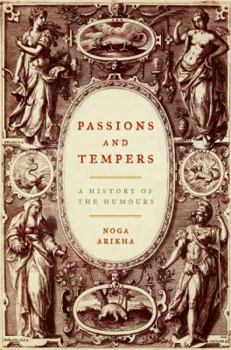Passions and Tempers: A History of the Humours
Select Format
Select Condition 
Book Overview
"Passions and Tempers may excite passions and tempers in some of its readers, as a good work of intellectual history should. You will learn a lot from its pages." --Washington Post The humours--blood, phlegm, black bile, and choler--were substances thought to circulate within the body and determine a person's health, mood, and character. The theory of humours remained an inexact but powerful tool for centuries, surviving scientific changes and offering...
Format:Hardcover
Language:English
ISBN:0060731168
ISBN13:9780060731168
Release Date:May 2007
Publisher:Ecco Press
Length:400 Pages
Weight:1.60 lbs.
Dimensions:1.3" x 6.0" x 9.0"
Customer Reviews
4 ratings
Excellent
Published by Thriftbooks.com User , 16 years ago
As a student of Medical Astrology, humour plays an important role to the evaluation. But to understand how the ancient sages thought is also as important, and "Passions and Tempers" provides an important historical view as to how and when all this was thought up. I just hope she also finds the interest to write about medical astrology and the importance it had in medical history. Her book addresses very little on this subject which was as or more important than humours. David-San Juan, Puerto Rico
Ancient Good Humours for the Neo-Pagan Reader+
Published by Thriftbooks.com User , 16 years ago
I was surprised by this book on the 'History of Bodily Humours'.At first,i thought it would be a boring history book by a christian scholar.But,the topic of how one's body fluids influenced one's behaviour,aroused my attention.Theories about humours have intrigued philosophers and doctors alike,since the dawn of humankind.The affects and effects,of humours, on civilizations are profound.Leaders and rulers,throughout history,were at the mercy of superstitous medics.With the spread of travel and communication, isolated biases began to erode,among learned scientists.This book is open-minded about 'paganism'.Christianity stymied creative scientific opinions and research was cloaked by the pseudo-science of alchemy.Noga Arikha writes a compelling book about the impact the body's humours have had on political and scientific thinking,from the ancients til today.
Excellent narrative on a difficult subject
Published by Thriftbooks.com User , 17 years ago
Arikha has tackled a rich and challenging subject, nothing less than explaining humoural theory, a medical model that dominated the Western and Arabic worlds for thousands of years. This wonderful book lucidly traces the evolution of this complex thinking over time. And she does a great job of showing how the model and its metaphors still influence our language and thinking today. It's a welcome addition to the long bibliography of studies that show how ancient ideas and beliefs still resonate in our time and is a worthy successor to the many similar projects produced by earlier generations of Warburg Intstitute-trained scholars. Read it if you're interested in medical history or in the many ways humans have tried to make sense of the different ways our bodies and our minds experience and perceive the world around us.
Excellent
Published by Thriftbooks.com User , 17 years ago
This is an illuminating, marvelous, and captivating book. As a work of scholarship it recounts in fascinating detail the history of humours, those mysterious forces that, it was believed for more than 2000 years, govern our bodies and minds. In the last century, of course, scientific research has discredited the theory; today, humours are regarded by many as an embarrassing artifact of ignorance and superstition, the equivalent of "the world is flat" or "the sun revolves around the earth." But humoural theory remains nonetheless one of the great achievements of the human imagination, an often beautiful, subtle and complex effort to understand our nature. Arikha has not only written a rich account of humoural medicine before the modern era (the book contains many extraordinary historical prints of the body) she has also brought to life this deep philosophical music. The many great thinkers who applied themselves to humoural theory sought to transcend the alienation from which we all suffer, to harmonize the warring and discordant elements within us and, in a larger sense, to unite mind to body and man to nature. Western culture too often forgets as it corrects; "Passions and Tempers" recovers something essential: the soulfullness of the body. "Even when wrong," Arikha argues, "a theory can help us understand, if not the world, then perhaps ourselves."





